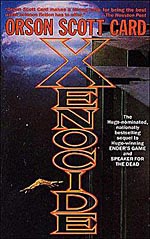
![]() Rabindranauth@DDR
Rabindranauth@DDR
9/5/2014
![]()
Well, there's no doubt about it for me. Xenocide's the best Ender book of the series so far.
As the Lusitania Fleet draws nearer to bring an end to the rebellion on Lusitania, a young girl on the planet of Path begins to unravel the mystery of Demosthenes, a mystery that will lead her to discovering Jane's existence. On Lusitania itself, the peaceful world that Ender envisioned for humans, buggers and piggies to live together on begins to break apart, and at the heart of the turmoil lies the descolada, the super virus that plays a larger part in Lusitania's existence than anyone possibly imagined. As tensions begin to boil over, old prejudices come to the fore and emotions begin to rule, there is only one solution that will bring peace to the planet of Lusitania. There will be xenocide.
Xenocide is a vast improvement on Speaker of the Dead, in my books. After hundreds of pages laboriously exploring the relationships between a group of characters I didn't care about, and waxing lyrical every opportunity his personal morals and tenets, Orson Scott Card delivers a book that's actually interesting to read. There are two big factors that made Xenocide a much better read, in my books.
The first is the nature of the plot. Gone are the in depth explorations of relationships and their philosophical and metaphysical undertones, vehicles used to tout Card's particular thoughts on a variety of issues, between characters I don't care about. Instead, offworld events have come into play and affect life on the planet. Lusitania is about to come under attack, and as the von Hesses continue to explore the descolada and the effect it has on the piggies, the revelations that abound are explosive, to say the least.
What made the plot so interesting to me was the way Card handles the story. Over the course of the novel, so many complicated, convoluted situations arise that it made for fascinating reading simply to see what possible course of action the characters would take next. Situations that tested some of their most deeply held tenets and beliefs. Often times, characters found themselves in completely impossible dilemnas, with choices that would make a rock or a hard place a welcome sight. I'd be lying if I said that it didn't make for good reading. The progressing chain of events made the book zip by much faster than Speaker of the Dead, which, considering it's a few hundred pages bigger, is a bit amusing to me.
The next big factor that added to the pull of the story is the introduction of a new character and world, ones that I was actually interested in. I still can't bring myself to care much for Lusitania and it's plight, but Qing-jao the godspoken of the planet of Path is an entirely different tale. Immediately I was absorbed into the depiction of her very alien culture and the upbringing she receives in order to become a godspoken, and my interest in her parts of the book slowly increased as the circumstances behind the unique society and conditions on Path are revealed. As the plot progresses and she makes leaps and strides on her end of the situation, things take on an even more interesting twist when it fast becomes clear that maybe she's not the key character for that particular viewpoint.
However, as interesting as these factors made the book at times, there's the other side of the coin.
Once again, after an interesting set up with an engaging character, Card wastes no time in hopping right back up on his pulpit and waxing lyrical. His long winded diatribes on morality and life, though not as rampant and torturous as they were in Speaker for the Dead, still made me put down the book in decided disinterest multiple times over the course of the read, with only the promise of the very engaging plot keeping me from outright abandoning it altogether. These diatribes also had the side effect of bogging the plot down, effectively making the first half of the book drag so badly I quite literally took two months to read the first three hundred pages, and two days the last three hundred.
In addition to this, more time is spent on the repercussions of the events in Xenocide on Ender's family, a group of people I decidedly cannot stand reading after the award winning torment that is Speaker for the Dead. As the von Hesses labor to prevent an outright conflict between the piggies and humans, the choice, though clear is certainly not unanimous: the descolada must be dealt with.
Ultimately, the fact that it actually contains a plot makes this book a much better book than Speaker for the Dead is for me. I finally get why people love these books; when Card wants to, he can put together a very interesting story. As to why I consider it a better novel than Ender's Game, it's quite simply a richer read. Not only do all the characters have their own plot threads in Xenocide, but they act them out in ways entirely determined by their personalities that not only make these actions completely inexplicable at times, but a wonderfully knotty situation that only gets worse before it gets better. Combined with the revelations behind the piggies, Jane and the descolada, which was infinitely better handled than it was in Speaker for the Dead, it all around simply made for a much more engaging read. The only people I can honestly recommend these books to are die-hard fans of Ender's Game. Emphasis on die-hard.
http://drunkendragonreviews.wordpress.com/